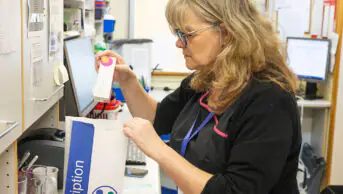
Shutterstock.com
Pharmacy owners have warned that the “financial viability” of community pharmacies is at risk as an NHS crackdown on prescriptions for cheap over-the-counter (OTC) drugs begins to bite.
In its 2018 annual report, McKesson – the parent company of LloydsPharmacy – said that a drop in prescription volume following the NHS’s decision to limit the number OTC drugs supplied on prescription has resulted in a drop in its earnings.
“We have experienced slower growth of prescription volumes flowing through our pharmacies primarily due to NHS designating some prescription drugs as over-the-counter (OTC), thereby reducing fee income at our Lloyds Pharmacies,” the report said.
In March 2018, NHS England published guidance limiting prescriptions for treatments for 35 common minor conditions, including indigestion, cradle cap, haemorrhoids, head lice, mild acne, and “minor conditions associated with pain”. It estimated the recommendations could save it almost £100m each year.
At the time, NHS Clinical Commissioners, which represents clinical commissioning groups (CCGs), said some of its members “had already acted to limit prescribing of medicines that can be purchased over the counter prior to the publication of the guidelines”. And in June it emerged that four Derbyshire CCGs have decommissioned a minor ailments service, as a result of NHS England’s guidance.
A spokesperson for multiple Rowlands Pharmacy agreed that the restrictions would impact on prescription volumes and consequently “impair the financial viability of many community pharmacies”.
“Along with local service decommissioning, it is another example of a short-term salami-slicing approach to funding community pharmacy in England, which is occurring at a time when a new contract has yet to be discussed, let alone agreed,” they said.
Nick Hunter, chief officer of Nottingham Local Pharmaceutical Committee, said CCGs were “probably pushing this guidance a lot harder than it was intended”, adding that his members were expecting a substantial impact from the changes.
He said the difference in income between dispensing a prescription and selling it OTC would depend on the product, but his members feared that patients would buy the readily available OTC products from somewhere other than a pharmacy.
“A couple of our pharmacies tried to work it out and they calculated that nine in ten of what would have been prescriptions would probably go elsewhere, for example the supermarket,” he said.
David Hamilton, commercial director at Well Pharmacy, said the guidance was likely to have an impact on prescription volumes “in some locations”. But he said the total prescription volumes across England rose in 2017, and that the change was likely to increase sales of OTC products in community pharmacy.


